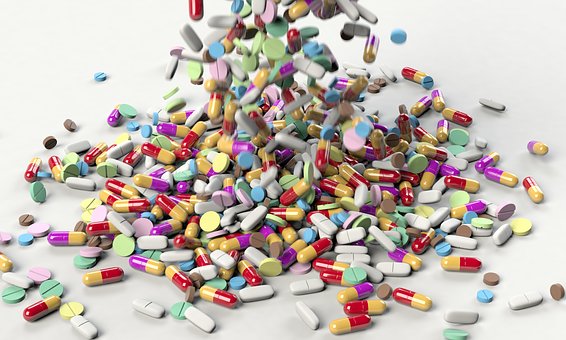


(Photo/Pixabay)
Nowadays, a vast number of health care products, including things like melatonin and anti-aging pills, can be found all over WeChat. Surprisingly the primary consumers are not middle-aged and older adults, but people belonging to the post-90s generation.
China's under-30s seem to have fallen into a state of deep health anxiety. They drink wolfberry tea, buy various beauty machines and invest in health care products, promoting growth in the health product industry.
Health anxiety of the post-90s
Recently, a popular topic was posted on Weibo, "the post-90s dare not see the medical examination report," striking a chord with many young people.
Many agreed with the post. The post-90s don't want to do a physical exam for fear of the results, reflecting the fact that they are not confident about their physical health.
Zhang Ming, who works in a grassroots unit, said that he is under so much pressure that he keeps liver tablets and blood pressure pills in his backpack. "I am under 30 years old. I quit smoking and drinking. Apart from supporting my family, I use my money to buy health care products every month," said Zhang. He added that he is not unique, explaining that many of his colleagues have also got on board the health train early.
According to the investigation, on the one hand, health anxiety present in the post-90s generation could come from entering the workplace for the first time. On the other hand, as the only child in their family, their sense of pressure to succeed may be higher than other age groups.
According to statistics, 188 million people were born in China between 1990 to 1999, accounting for 14.1 percent of the total population. This generation bears the burden of work and life, and will potentially have to look after aging parents and children with the help of only a spouse.
Health care products segment the market
The China Health Care Association predicted that the market size of dietary supplements in China would grow at an average annual rate of 10 percent in the next 10 years, and is expected to surpass Japan to become the world's second-largest dietary supplement market.
Industry insiders believe that young consumers' requirements in regards to health care products are different from those of middle-aged and older adults. The younger generation regards health care products as a way of life rather than just a medicinal item, and they are also picky about a brand's design and concept.
Health care product companies have risen to the challenge, inviting young stars to advertise for them. For example, American brand Nature's Bounty asked famous Korean star Kim Soo-hyun and Chinese actress Tang Wei to be brand ambassadors from 2013 to 2015, causing many young fans to buy their products.
In the past, health care product companies preferred to choose TV as the primary platform for advertising, but now they are more inclined to advertise online. Advertisements have since appeared on Weibo and WeChat, among other social platforms.
Marketing mess behind the scenes
Chinese star Wu Xin eating five health care products at the same time during a variety show drew the audience's attention. It seems that ordinary people aren't the only ones to suffer from health anxiety. The business opportunity linked with this kind of panic is self-evident, but the chaos behind the scenes cannot be ignored.
Some time ago, melatonin suddenly became popular online. When searched on Baidu Baike, it said that melatonin delayed aging and improved sleep, but did not mention the dangerous potential side effects. Long-term use and high doses of melatonin may cause hypothermia, release too much prolactin, lead to infertility, and reduce sexual desire in men. Doctors said hospitals around the world are using melatonin with caution when treating insomnia.
Experts pointed out that health care products are not medicine, and people should avoid excessive use. A combination of proper diet, moderate exercise, and giving up smoking and drinking will better help psychological balance, helping you stay young.
 Fire brigade in Shanghai holds group wedding
Fire brigade in Shanghai holds group wedding Tourists enjoy ice sculptures in Datan Town, north China
Tourists enjoy ice sculptures in Datan Town, north China Sunset scenery of Dayan Pagoda in Xi'an
Sunset scenery of Dayan Pagoda in Xi'an Tourists have fun at scenic spot in Nanlong Town, NW China
Tourists have fun at scenic spot in Nanlong Town, NW China Harbin attracts tourists by making best use of ice in winter
Harbin attracts tourists by making best use of ice in winter In pics: FIS Alpine Ski Women's World Cup Slalom
In pics: FIS Alpine Ski Women's World Cup Slalom Black-necked cranes rest at reservoir in Lhunzhub County, Lhasa
Black-necked cranes rest at reservoir in Lhunzhub County, Lhasa China's FAST telescope will be available to foreign scientists in April
China's FAST telescope will be available to foreign scientists in April "She power" plays indispensable role in poverty alleviation
"She power" plays indispensable role in poverty alleviation Top 10 world news events of People's Daily in 2020
Top 10 world news events of People's Daily in 2020 Top 10 China news events of People's Daily in 2020
Top 10 China news events of People's Daily in 2020 Top 10 media buzzwords of 2020
Top 10 media buzzwords of 2020 Year-ender:10 major tourism stories of 2020
Year-ender:10 major tourism stories of 2020 No interference in Venezuelan issues
No interference in Venezuelan issues
 Biz prepares for trade spat
Biz prepares for trade spat
 Broadcasting Continent
Broadcasting Continent Australia wins Chinese CEOs as US loses
Australia wins Chinese CEOs as US loses